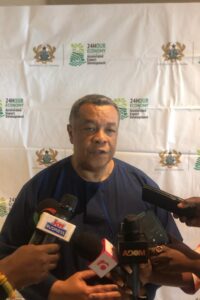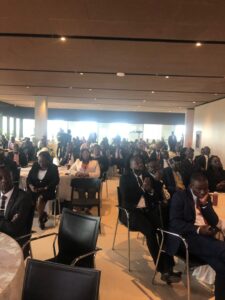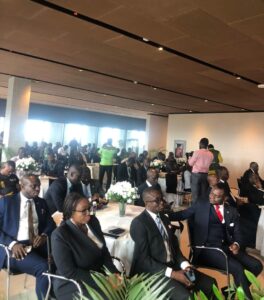24-Hour Economy and Export Development Team Engage Banks on Private Sector Financing
 The Office of the Presidential Advisor on the 24-Hour Economy and Accelerated Export Development held a high-level engagement with representatives from various banks in Ghana on Thursday, September 18, 2025. The meeting took place at the headquarters of the Bank of Ghana in Accra.
The Office of the Presidential Advisor on the 24-Hour Economy and Accelerated Export Development held a high-level engagement with representatives from various banks in Ghana on Thursday, September 18, 2025. The meeting took place at the headquarters of the Bank of Ghana in Accra.
The session was part of efforts to mobilize financial sector support for the implementation of the government’s 24-Hour Economy initiative and strategies for boosting Ghana’s exports.
 Speaking in an interview with mrwoode.com, Mr. Augustus Goosie Tanoh the Presidential Advisor on the 24-Hour Economy and Accelerated Export Development emphasized that financing is a key pillar of the entire economic transformation agenda.
Speaking in an interview with mrwoode.com, Mr. Augustus Goosie Tanoh the Presidential Advisor on the 24-Hour Economy and Accelerated Export Development emphasized that financing is a key pillar of the entire economic transformation agenda.
According to Mr. Tanoh, the 24-Hour Economy is a private-sector-led initiative which makes collaboration with banks and financial institutions critical. We engaged the banks to discuss the content of the program, the role they can play and how best they can support private sector actors in the value chains they have chosen, he said.
 Mr. Tanoh pointed out that one of the major challenges facing Ghana’s economy is the limited access to credit for Small and Medium Enterprises (SMEs). Most SMEs in Ghana find it difficult to access credit because of stringent collateral requirements. Not everyone owns a house yet that is often a standard requirement for accessing loans, he stated.
Mr. Tanoh pointed out that one of the major challenges facing Ghana’s economy is the limited access to credit for Small and Medium Enterprises (SMEs). Most SMEs in Ghana find it difficult to access credit because of stringent collateral requirements. Not everyone owns a house yet that is often a standard requirement for accessing loans, he stated.
To address this, discussions were held around various government-backed guarantee schemes that can be used as collateral alternatives. These include:
The Development Bank Ghana (DBG) Guarantee Scheme
The Ghana Export-Import Bank (GEXIM) Guarantee Scheme
The Ghana Incentive-Based Risk-Sharing System for Agricultural Lending (GIRSAL)
These schemes are recognized by the Bank of Ghana and provide viable alternatives to traditional collateral requirements, making financing more accessible for SMEs, Mr. Tanoh noted.
Another key issue discussed was the need to raise long-term capital to support private sector-led growth. Mr. Tanoh highlighted the role of the Development Bank Ghana (DBG) in providing such long-term financing to catalyze industrialization and job creation.
You cannot grow an economy in one year. You cannot grow an economy with interest rates at 36 percent. You cannot grow an economy when young entrepreneurs are required to use a house as collateral, he stressed.
The meeting concluded with a strong call for partnership between the banking sector, government institutions and private sector actors to create a more inclusive and sustainable economic growth model for Ghana.
